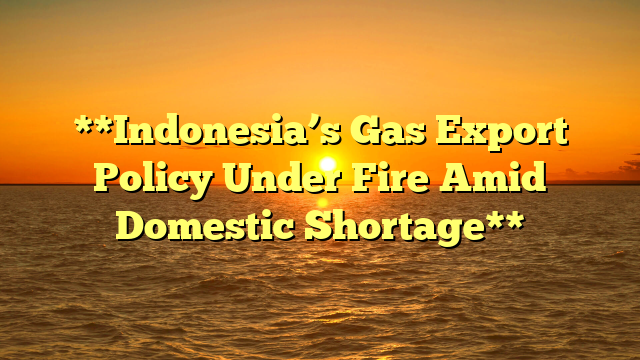Indonesia, one of the world’s leading natural gas producers, is facing mounting criticism over its gas export policy as the country struggles with a domestic supply shortage. Despite having vast gas reserves, Indonesia continues to export significant portions of its natural gas to international markets, while industries and households at home experience rising gas prices and supply disruptions. This situation has sparked debates on whether the government should prioritize domestic consumption over foreign contracts. As the country seeks to balance economic gains from exports with energy security for its citizens, Indonesia’s gas export policy is under increasing scrutiny.
One of the main reasons Indonesia continues to export gas despite a domestic shortage is its long-term contractual commitments with foreign buyers. The country has agreements with major importers such as Japan, South Korea, and China, ensuring a steady revenue stream from gas exports. slot demo mahjong , often spanning decades, were signed when Indonesia had surplus gas production. However, as domestic demand has surged in recent years, fulfilling these export obligations has left the local market with inadequate supply. Breaking or renegotiating these contracts is complex and could harm Indonesia’s reputation as a reliable energy supplier.
Meanwhile, industries and businesses within Indonesia are struggling with gas shortages and rising prices. The manufacturing, petrochemical, and power generation sectors, which rely heavily on natural gas, have been forced to either reduce production or switch to more expensive fuel alternatives. Small businesses, including those in the food and beverage sector, are also feeling the impact, as higher gas prices translate into increased operating costs. The burden of these price hikes is ultimately passed down to consumers, contributing to inflation and slowing economic growth.
The domestic gas crisis has also reignited discussions about Indonesia’s gas infrastructure and exploration policies. Many experts argue that while Indonesia has large reserves, insufficient infrastructure for gas transportation and distribution prevents efficient allocation of resources. The lack of adequate pipelines connecting gas-rich regions like Sumatra and Kalimantan to demand centers in Java and Bali has forced the country to rely on costly LNG shipments instead of direct pipeline transfers. Expanding and modernizing gas infrastructure could help alleviate supply bottlenecks and reduce dependence on expensive imports.
In response to public pressure, the Indonesian government has started reviewing its gas policies, considering measures to reduce exports and allocate more gas for domestic consumption. Some policymakers have proposed increasing the Domestic Market Obligation (DMO), which requires gas producers to reserve a portion of their output for local use before exporting the remainder. However, implementing stricter DMO policies could discourage foreign investment in Indonesia’s gas sector, as international energy companies might view these restrictions as unfavorable to their business interests.
As Indonesia navigates this complex issue, finding a balance between export revenues and domestic energy security remains a critical challenge. While gas exports contribute significantly to the country’s foreign exchange earnings, ensuring stable and affordable energy for Indonesian businesses and households must be a priority. Investing in new gas exploration, improving distribution networks, and renegotiating export contracts to favor domestic supply are essential steps toward addressing the crisis.
In conclusion, Indonesia’s gas export policy is facing increasing criticism amid a domestic supply shortage that is affecting industries, businesses, and households. The challenge lies in striking a balance between fulfilling export commitments and ensuring energy security for the nation. By adopting a more strategic approach to gas management, Indonesia can strengthen its economy while safeguarding the interests of its people.
**Indonesia’s Gas Export Policy Under Fire Amid Domestic Shortage**










